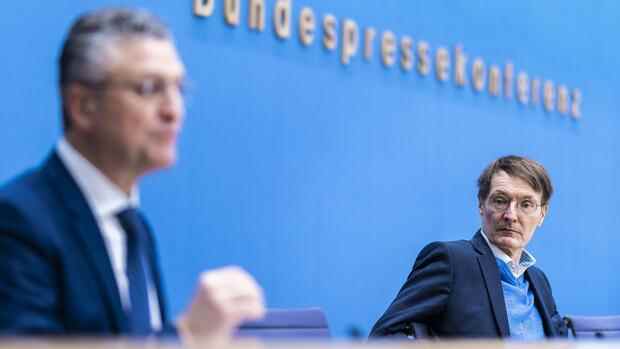Berlin That was not how Health Minister Karl Lauterbach (SPD) imagined it. On Monday, Bavaria’s Prime Minister Markus Söder (CSU) opposed the facility-related compulsory vaccination, a few hours later CDU leader Friedrich Merz seconded.
On the same day, other federal states announced easing of Lauterbach’s warnings – in addition to Bavaria, Berlin and Brandenburg.
And as if that wasn’t enough, Finance Minister Christian Lindner (FDP) opposed the head of the Robert Koch Institute (RKI), Lothar Wieler. His approach to shortening the convalescent status was “extremely unfortunate”. However, Wieler’s personalities fall under Lauterbach’s jurisdiction; such unequivocal references are highly unusual among cabinet colleagues.
Lauterbach has only been in office for a few months and had promised to end the pandemic quickly at the start. The measures in force and also the obligation to vaccinate are among Lauterbach’s central instruments for this course, which is now being increasingly openly questioned. However, the minister does not give the impression that he wants to move away from it. On the contrary.
Top jobs of the day
Find the best jobs now and
be notified by email.
Lauterbach said on Tuesday at the federal press conference that he was surprised by the decision from Bavaria to make vaccination compulsory for the facility. Söder had announced a “generous transitional arrangement”, which “de facto initially amounts to a suspension of enforcement.” According to the Prime Minister, it takes time to “make the whole thing sensible”.
This criticism was not new for Lauterbach – but the fact that a federal state was suspending the rule was. Health authorities have been warning for weeks that they cannot adequately control compulsory vaccination. Other federal states had also called for transitional periods, but did not get through to the minister.
He sees “few lines of compromise,” said Lauterbach on Tuesday. The countries would have had enough time to initiate everything necessary for compulsory vaccination. There is no deadline that he can extend. In addition, the law is not a form of harassment for nursing staff, but serves to protect vulnerable groups. It could “not work” if nurses were not vaccinated.
criticism of openings
The Federal Minister of Health criticized the fact that Bavaria apparently hopes that the pandemic will be over after the omicron wave is only “completely permissible for a layperson”. But politicians with a “huge team of experts” could not think like that. The suspension of the law creates the impression that politicians can be blackmailed by protesting on the street.
The words will have been heard carefully in the state chancellery of the other federal states. Lauterbach’s problem is that he is dependent on the federal states for the implementation of the partial vaccination requirement.
These are responsible for enforcement, he said in Berlin. In other words: Lauterbach can demand whatever he wants – without the country heads, he is left empty-handed. It is quite possible that the conflict will come to light at the federal-state meeting next week.
Lauterbach’s warnings about opening too quickly are similarly questionable. The federal and state governments want to discuss a relaxation plan at their top meeting. But this would have to be done carefully, said Lauterbach.
“We don’t really have the situation under control yet,” he said. Openings are not justifiable at the moment. He was surprised at the discussion about it, which was out of place. Every day, 100 to 150 people are killed, “far too many”.
If the measures were withdrawn quickly, “the wave would be significantly lengthened and a rapid flattening out, as we are striving for, would not be achieved.” Openings “we only harm ourselves,” said the minister.
Lauterbach is increasingly alone with his strategy. Federal states such as Schleswig-Holstein, Bavaria, Hesse, Berlin and Brandenburg have already announced openings. Among other things, it is about an end to the 2G rule – access only for vaccinated or recovered people – in retail. This must fall nationwide, demanded FDP boss Lindner.
Trust in Wieler
It is also Lindner who puts Lauterbach under pressure on another front. He had reiterated his party’s criticism of the Robert Koch Institute’s decision to shorten the convalescent status.
He had “great doubts” about this unannounced and surprising decision, Lindner told RTL on Monday. “The technical and communication decision was in the hands of Mr. Wieler, and I think one can say that that was extremely unfortunate.”
Before Lindner, the designated FDP Secretary General Bijan Djir-Sarai had personally criticized the actions of the RKI and its boss in the “Spiegel”. “However, Mr. Wieler can no longer be sure of the trust of the FDP due to this recent misconduct, which unfortunately is not an isolated case.”
Lauterbach was also unimpressed on Tuesday. “Mr. Wieler has my full confidence,” he said. “We work well together.” Wieler celebrated his 61st birthday on Tuesday. “In this respect, everything is fine,” added the head of the institute.
More: Söder wants to suspend compulsory vaccination in nursing homes – and is causing severe criticism
